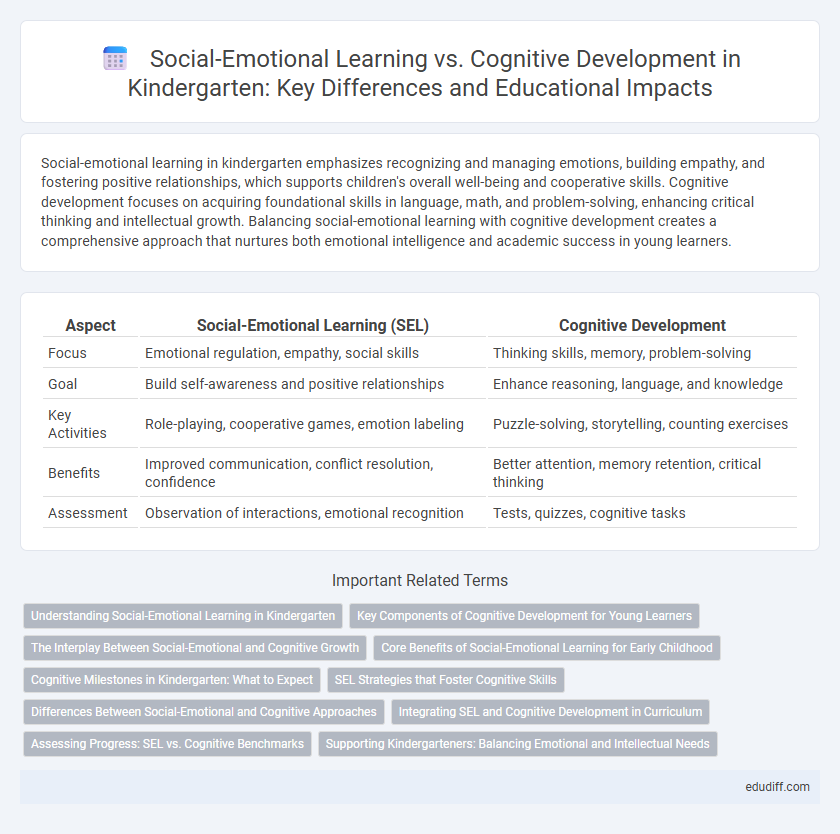Social-emotional learning in kindergarten emphasizes recognizing and managing emotions, building empathy, and fostering positive relationships, which supports children's overall well-being and cooperative skills. Cognitive development focuses on acquiring foundational skills in language, math, and problem-solving, enhancing critical thinking and intellectual growth. Balancing social-emotional learning with cognitive development creates a comprehensive approach that nurtures both emotional intelligence and academic success in young learners.
Table of Comparison
| Aspect | Social-Emotional Learning (SEL) | Cognitive Development |
|---|---|---|
| Focus | Emotional regulation, empathy, social skills | Thinking skills, memory, problem-solving |
| Goal | Build self-awareness and positive relationships | Enhance reasoning, language, and knowledge |
| Key Activities | Role-playing, cooperative games, emotion labeling | Puzzle-solving, storytelling, counting exercises |
| Benefits | Improved communication, conflict resolution, confidence | Better attention, memory retention, critical thinking |
| Assessment | Observation of interactions, emotional recognition | Tests, quizzes, cognitive tasks |
Understanding Social-Emotional Learning in Kindergarten
Social-emotional learning in kindergarten fosters children's ability to recognize and manage emotions, build positive relationships, and develop empathy, which are crucial for successful social interactions and emotional regulation. Cognitive development involves skills such as problem-solving, memory, and language acquisition, forming the foundation for academic learning. Understanding social-emotional learning helps educators create supportive environments that enhance both emotional well-being and cognitive growth in young children.
Key Components of Cognitive Development for Young Learners
Cognitive development in kindergarten focuses on key components such as memory enhancement, problem-solving skills, and language acquisition, which are essential for young learners' academic success. Activities that stimulate curiosity and encourage exploration help solidify these cognitive foundations, promoting logical thinking and comprehension. Integrating play-based learning and hands-on experiences supports the growth of neural pathways related to attention, reasoning, and information processing in early childhood.
The Interplay Between Social-Emotional and Cognitive Growth
Social-emotional learning in kindergarten fosters empathy, self-regulation, and collaboration, directly influencing cognitive functions like problem-solving and memory retention. Early development of social skills enhances neural pathways that support executive functions, enabling children to better focus, reason, and absorb academic material. Integrating social-emotional strategies with cognitive tasks accelerates holistic growth, preparing children for successful learning experiences.
Core Benefits of Social-Emotional Learning for Early Childhood
Social-emotional learning (SEL) in early childhood enhances children's ability to manage emotions, build positive relationships, and develop empathy, essential skills that support cognitive development and academic success. SEL fosters self-regulation, cooperation, and problem-solving, creating a strong foundation for lifelong learning and social interaction. Research indicates that children engaged in SEL programs exhibit improved behavior, increased motivation, and higher achievement in kindergarten and beyond.
Cognitive Milestones in Kindergarten: What to Expect
Kindergarten cognitive milestones include recognizing letters, counting objects, and understanding basic concepts of time and sequencing, which are crucial for early academic success. Children develop problem-solving skills and begin to grasp cause-and-effect relationships, enhancing their critical thinking abilities. These cognitive achievements lay the foundation for reading readiness and numeracy essential in future learning stages.
SEL Strategies that Foster Cognitive Skills
Social-emotional learning (SEL) strategies such as self-regulation, empathy, and collaborative play actively contribute to the development of executive functioning and problem-solving skills in kindergarten children. Incorporating activities like role-playing, mindfulness exercises, and group discussions fosters both emotional intelligence and higher-order cognitive processes. Research shows that SEL-centered curriculum enhances attention, memory, and language abilities essential for early academic achievement.
Differences Between Social-Emotional and Cognitive Approaches
Social-emotional learning in kindergarten emphasizes skills like empathy, self-regulation, and interpersonal relationships, while cognitive development focuses on intellectual abilities such as memory, problem-solving, and language acquisition. Social-emotional approaches foster emotional intelligence and collaboration, critical for building a supportive classroom environment, whereas cognitive methods promote critical thinking and academic readiness. Understanding these distinct domains helps educators create balanced curricula that cater to both emotional growth and intellectual development in young children.
Integrating SEL and Cognitive Development in Curriculum
Integrating social-emotional learning (SEL) and cognitive development in kindergarten curricula enhances children's ability to manage emotions while improving critical thinking skills. Research shows that embedding SEL practices such as self-regulation, empathy, and cooperative play alongside problem-solving activities fosters holistic growth and academic success. Effective programs combine interactive storytelling, collaborative projects, and reflective discussions to support neural development and emotional intelligence simultaneously.
Assessing Progress: SEL vs. Cognitive Benchmarks
Assessing progress in kindergarten involves distinct yet complementary approaches for social-emotional learning (SEL) and cognitive development. SEL benchmarks measure skills like emotional regulation, empathy, and cooperation, using tools such as observation checklists and self-report scales to track interpersonal growth. Cognitive development assessments focus on language, numeracy, and problem-solving abilities, employing standardized tests and performance tasks to evaluate academic readiness and intellectual milestones.
Supporting Kindergarteners: Balancing Emotional and Intellectual Needs
Supporting kindergarteners requires a balanced approach that integrates social-emotional learning with cognitive development to foster well-rounded growth. Emphasizing emotional regulation, empathy, and positive social interactions enhances children's ability to engage effectively in problem-solving and critical thinking tasks. Creating an environment that nurtures both emotional well-being and intellectual curiosity supports kindergarteners in achieving foundational skills critical for lifelong learning.
Social-emotional learning vs Cognitive development Infographic

 edudiff.com
edudiff.com